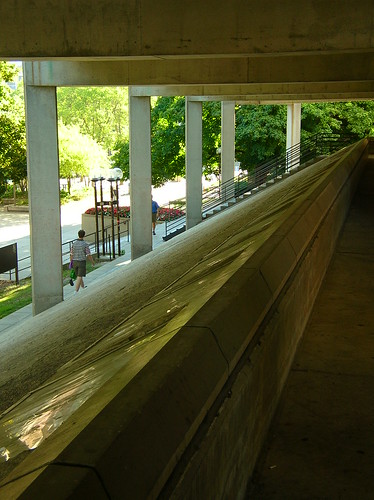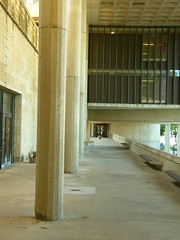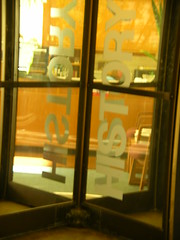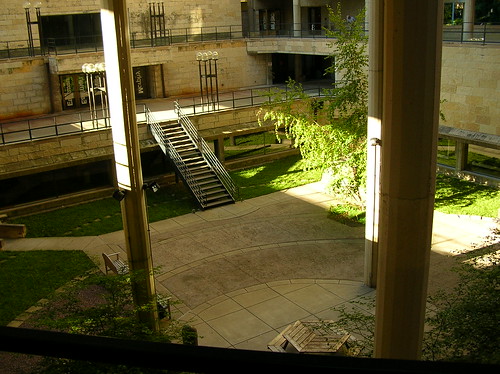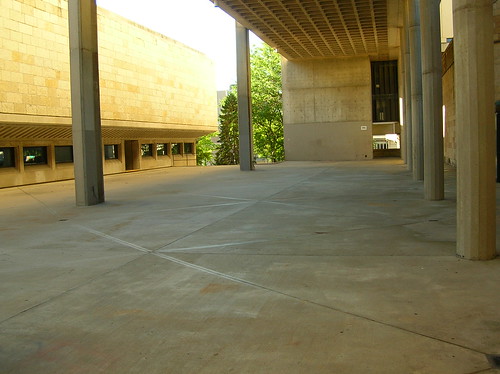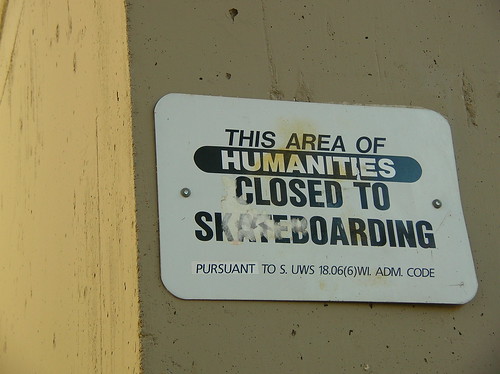Sunday, September 04, 2005
Oh, Humanities!
Some buildings are sturdy and beautiful, and you want them to last forever. The most "collegiate" buildings on our campus are a couple of stately, red stone examplars of the late-Victorian "Richardson Romanesque" style. I love them.
Then there are buildings that seem like "tear-downs" from the moment they're built, destined by cheapskate corner-cutting to fall into premature decripitude and by deeply flawed design to be destroyed and replaced in less than 30 or 40 years. What a terrible, wasteful life span for a major campus building. This seems to be the fate of our Humanities building.
Designed and built during the anti-war protest movement, the building's salient design concept was "fortress."
It might have looked nice as a parking structure. But a home for, among others, the History department?
This would be a nice green space, but for the fact that it's tucked away inside the huge concrete bunker like a castle keep.
Well, at least this space looks great for skateboarding.
Noooo!
Then there are buildings that seem like "tear-downs" from the moment they're built, destined by cheapskate corner-cutting to fall into premature decripitude and by deeply flawed design to be destroyed and replaced in less than 30 or 40 years. What a terrible, wasteful life span for a major campus building. This seems to be the fate of our Humanities building.
Designed and built during the anti-war protest movement, the building's salient design concept was "fortress."
The battlements of the Humanities building. The idea was that
faculty and academic staff could line the walls and
roll large balls of flaming tar or pour boiling oil on unruly students, below.
faculty and academic staff could line the walls and
roll large balls of flaming tar or pour boiling oil on unruly students, below.
It might have looked nice as a parking structure. But a home for, among others, the History department?
This would be a nice green space, but for the fact that it's tucked away inside the huge concrete bunker like a castle keep.
Well, at least this space looks great for skateboarding.
Noooo!
So where is the skateboarding area?
Comments:
<< Home
I have long noticed that I am a lone defender of buildings like these. It comes with the territory of getting a degree in the history of modern architecture (more or less). I think it's beautiful. Maybe I'll go chain myself to it!
And all you skateboarders can take the bus to downtown Middleton, where we have a skate park just for you!
And all you skateboarders can take the bus to downtown Middleton, where we have a skate park just for you!
Oscar, you are so right, these buildings were built with the purpose of twarting student protesters in the wake of the Sterling Hall bombing. However, are the new Grangier Hall or the Fluno Center any more astesic? The older buildings on campus were built using the most commonly used materials of the time: stone, brick, mortar, and clay. These materials have undoubltly stood the test of time. But to replicate these practices today would be cost prohibative. After all, the Univeristy is much more complex in its functions than 100 years ago, and has to use monetary resources to support these new propects that underwrite all disciplines of of study.
If you had written that these were pictures of a local penitentiary, I would have believed you.
Buildings on campuses should inspire and excite people, even if inspired and excited people makes others nervous.
Buildings on campuses should inspire and excite people, even if inspired and excited people makes others nervous.
It is a myth that the Humanities building was designed to thwart protesters. The Sterling Hall bombing was in 1970; Humanities was built in 1969 and was designed in 1966 ... well before the protests.
See http://www.news.wisc.edu/story.php?id=7297 for the scoop.
See http://www.news.wisc.edu/story.php?id=7297 for the scoop.
I agree, CM. What an eyesore.
When I first went to law school, our building was like that. Ugly concrete bunker with prison-like tendencies. Though I did have a friend who thought he could convert it into a good nightclub...
Fortunately, over the next 3 years, I witnessed the move to a new building and the destruction of the old one. (I couldn't find a picture of the old building in one piece, but maybe that's for the best.)
When I first went to law school, our building was like that. Ugly concrete bunker with prison-like tendencies. Though I did have a friend who thought he could convert it into a good nightclub...
Fortunately, over the next 3 years, I witnessed the move to a new building and the destruction of the old one. (I couldn't find a picture of the old building in one piece, but maybe that's for the best.)
Oh, it's a classic example of "brutalism." Well that changes everything! I thought it was just a classic example of "fugly."
Thanks for the correction, which essentially points out that the designers didn't even have understandable paranoia to excuse the design aesthetic. Please change the word "during" in paragraph 3 to "shortly before." Otherwise, I think everything in the post still works.
Post a Comment
Thanks for the correction, which essentially points out that the designers didn't even have understandable paranoia to excuse the design aesthetic. Please change the word "during" in paragraph 3 to "shortly before." Otherwise, I think everything in the post still works.
Subscribe to Post Comments [Atom]
<< Home
Subscribe to Comments [Atom]
